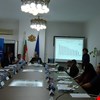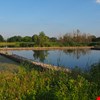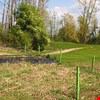
/ Central and Eastern Europe
Investing for the future to reduce the risks of disasters
On 9 October 2018, Global Water Partnership Central and Eastern Europe (GWP CEE) together with partners from DriDanube project held Consultations on the Principles on Investments and Financing for Water-related Disaster Risk Reduction at the Romanian National Meteorological Administration in Bucharest, Romania.

/ Central and Eastern Europe
Danube Floodplain project kicks off to improve transnational water management
The DANUBE FLOODPLAIN Project (Reducing the flood risk through floodplain restoration along the Danube River and tributaries) had its official “Kick-Off Meeting and First Stakeholder Event” on September 27-28, 2018 at the Capital Plaza Hotel, in Bucharest, Romania.

/ Central and Eastern Europe
Supporting drought management in Hungary with a new Operational System
A new Operational Drought and Water Scarcity Monitoring System was created in Hungary to assist communities and farmers in making timely interventions.

/ Central and Eastern Europe
Shared Vision Planning approach applied in Tisza River Basin
The uneven distribution and quality of water resources in the Tisza River Basin brings challenges on how to elaborate the Programme of Measures as required by the EU Water Framework Directive. The team of 43 experts is currently working on the update of River Basin Management Plan under the Interreg project JOINTISZA.

/ Central and Eastern Europe
Summer School brings youth in CEE a step closer to 2030 Agenda
The Summer School „Towards 2030 Agenda: A summer school for climate change, innovation and youth advocacy in water management“ took place on 1- 6 July 2018 at the Warsaw University of Life Sciences in Warsaw, Poland.

/ Central and Eastern Europe
Towards a more sustainable use of Danube river in Northwestern Bulgaria
On 28 June, a conference dedicated to the conservation and sustainable use of the Danube River in the Northwest Bulgaria was organized in Vratsa, Bulgaria. The event was jointly organized by Global Water Partnership Bulgaria (GWP Bulgaria) and the Regional Administration of Vratsa.

/ Central and Eastern Europe
Winner of Hungarian Stockholm Junior Water Prize 2018 announced
The Hungarian national final of the Stockholm Junior Water Prize, traditionally organised by GWP Hungary, was held on 26 May, 2018 in the Grand Hotel Margitsziget in Budapest.

/ Central and Eastern Europe
Towards 2030 Agenda: A summer school for climate change, innovation and youth advocacy in water management
The Summer School „Towards 2030 Agenda: A summer school for climate change, innovation and youth advocacy in water management“ will take place on 1- 6 July 2018 at the Warsaw University of Life Sciences in Warsaw, Poland.

/ Central and Eastern Europe
Nature-based solutions address water challenges in Central Europe
On the occasion of the World Water Day 2018 and its topic ‘Nature for Water’, we present the FramWat project. It brings an innovative approach to the implementation of the nature-based small water retention measures in the river basin management plans.

/ Central and Eastern Europe
Nature-based solutions for decentralized wastewater treatment in the Lower Danube
GWP Central and Eastern Europe successfully completed a project on innovative wastewater treatment, developed in cooperation with IRIDRA and the Water Science Institute in Slovenia. The project was supported by the EU Joint Research Centre and was implemented in Kamniška Bistrica River Basin Slovenia during the years 2016-2017.